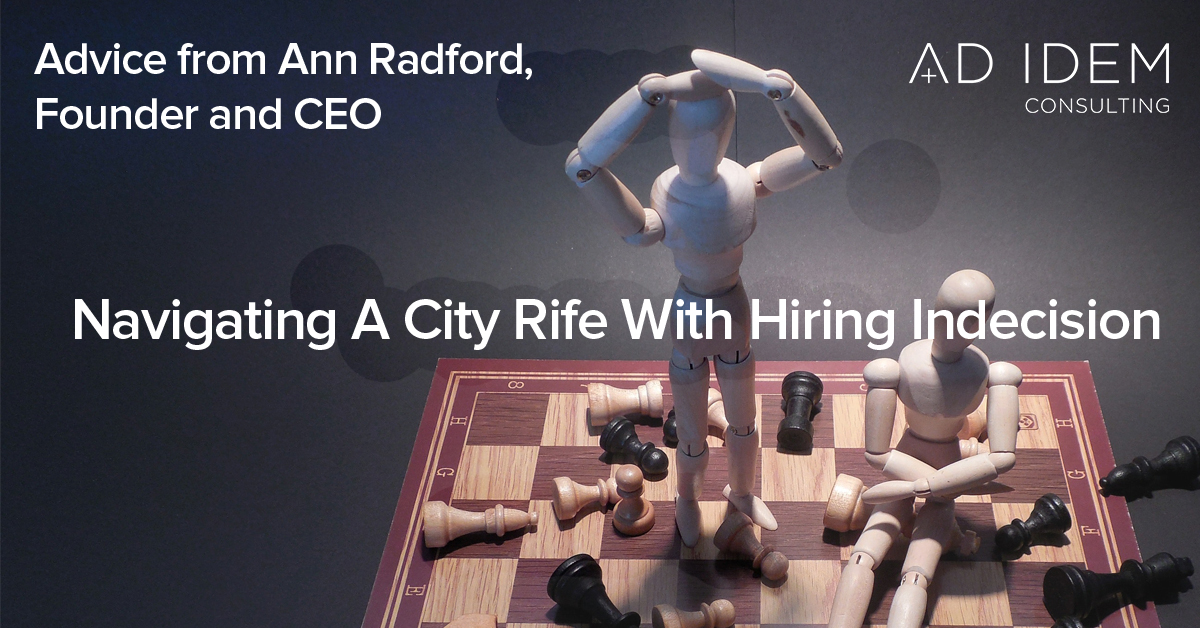By Ann Radford, Founder and CEO
In the month of April, we had a record number of interviews organised between clients and candidates. If you’re looking at the numbers, we should surely be showing a record number of placements with it. After all, interviews mean placements, and placements mean new roles for all those hopeful job seekers. Right?
Actually, no.
In these uncertain times, we’re finding that clients are organising first, second, and third (and often fourth) round interviews – with candidates at all levels – but they are not hiring. I mean, it might be that they’re hiring through a different route. It might be that they’re deciding to offer the role to that internal candidate they ruled out before they took the job to market. Or it might be that they feel they can find someone better, and although the candidates fitted the brief exactly, they believe that there is someone smarter, more experienced, or is a more perfect fit for their team. But it all seems a little unusual to us.
Whatever the reasons, it’s translating to less placements and less movement, which means less resignations, which means less roles. And while there is such painful uncertainty around our political landscape in the UK, we’re finding that we’re getting a plethora of excuses, justifications, and apologies from clients.
“We are placing the role on hold.”
“We’re thinking of restructuring the team.“
“Head office have reduced headcount.”
“The role is no longer going to be based in London”
These are some of the most commonly used reasons we’ve been getting lately. Along with “we simply need more time and more CVs”. One of our clients has asked for and interviewed nineteen excellent candidates for one role. And then guess what? They’ve yet to hire someone.
The fact is, the city is rife with indecision right now. And this can make it tricky for candidates, navigating an industry where three, four, or even five stage (yes, five!) interviews followed by rejections or no news is becoming commonplace. The only answer we can give them is that there is no answer.
However, there are some things you can do to make the process a whole lot easier on yourself.
- Accept The Current Reality
To start with, you’re going to have to accept this as the current reality. We have no political direction at present to help us predict what will happen in the final quarter of this year and we can’t as job seekers and recruiters do anything to influence this. Is the UK in or out? In more than out? Or more out than in? We simply don’t know, and therefore we try not to worry about what we can’t influence.
- Request Information About The Job’s Recruitment Process So Far
Explore with your recruiter the reality of the recruitment process you are embarking upon. Ask them questions, such as why is this job available? How long has it been in the market? And when has the client committed to make a decision by? Of course, goal posts change and circumstances alter for clients (which is pretty normal) so you’re going to have to take any answers with a pinch of salt. But you can request that your recruiter keeps you informed and aware. If the client is likely to take longer than you’re willing to wait, or they have a favoured internal candidate, it’s best to know that and make a decision from there.
- Be Honest With Others And Realistic With Yourself
Make the company or recruiter aware of any time frames you have, and be honest with yourself about your situation. If you need to know the outcome by a certain date, let them know. They may not be able to work to this but at least you have some clarity around the situation and from this you can make an informed decision. And if you know you need a job in two months’ time to pay the bills then you can’t rest on your laurels: apply directly, cast the net a little wider, and don’t expect the impossible from your recruiter.
- Take A Balanced Approach
Don’t let job searching take over your life. Looking for a job is stressful and can be all consuming; recognise the pitfalls and face facts around the client’s pace of recruitment, and accept that if the role is right for you it may, in this market, take a little longer to secure.
- Stick To Your Guns If You’re Clear On Your Next Move
It’s easy to become impatient and disillusioned with how long it’s taking to change roles. Be clear about what you are looking for from your next move and don’t be in a rush to compromise. Don’t start any job application processes unless it’s for a job you really want. These things can take time.
- Explore Options Where You Already Are
Explore promotion and project options internally that you had dismissed or that weren’t previously available to you. The state of play at the moment may actually work in your favour. For example, your organisation may be unable to hire that project professional they had wanted. Perhaps you could gain valuable experience by asking to work on the project, and come out the other side with more skills and a stronger CV. And who knows where the market will be in three- or six-months’ time.
- Be Patient. With Us, With Clients, And With Yourself
Finally, and I know it’s not always easy, but be patient. Before we know it, we will (hopefully) know what is happening here in the UK. Then companies will be forced to deal with that reality and hire for that eventuality. They will have held back for so long that they will need to hire and hire quickly, and all those projects that they put on ice will be go, go, go.
The good news is that whilst the market is undeniably slower, more cautious, and certainly indecisive, we are still hiring and there are clients who are taking advantage of the uncertainty by hiring quickly and securing some great talent. If you have the right skill set, we are still making deals and finding candidates their next opportunity.
So please, if you are undecided about looking for another role, consider taking the plunge and having a confidential chat with one of our team. You never know, we may have the right, decisive client looking to snap you up while all the others think about it…



